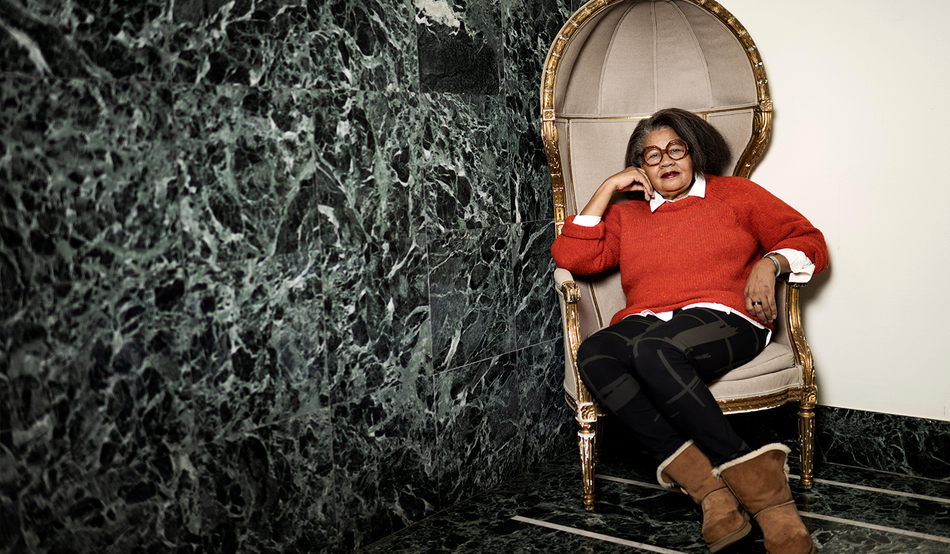“I loved writing this,” chuckles Jamaica Kincaid, pointing to the one long, playful sentence of acknowledgements at the close of Putting Myself Together. “I just laughed out loud at my own writing. All of [the names] are stories in themselves.”
Kincaid’s latest book, published earlier this year, is a smart collection of pieces stretching back to 1974, when the now internationally acclaimed author became a staff writer at the New Yorker. The texts—which span reviews, interviews, essays and fiction—speak to recurrent themes in her work: truth, time, power relations, gardens. They also evidence that her bold style, which eschews traditional elements of plot and narration, was there from the outset.
“When I was putting the book together, I looked at things again and I could not believe I was writing some of it only eight years after being sent away by my mother,” Kincaid tells me, referring to her move from Antigua to the United States at the age of 16 to work as a nanny. “All this time I had certain thoughts inside of me, but I didn’t know how to say them… I thought people would laugh at the way I write, but I didn’t care.”
“I wasn’t at all aware of the pervasiveness of racism,” she adds, of her first years after leaving the Caribbean. “I knew that I was black and a woman, but I didn’t know a young black woman wasn’t supposed to be at the New Yorker. All sorts of things would happen that I can now see was racism. But since I just thought that white people who were racist were being rude, I went on my way.”
Kincaid, who retired as a professor of African and African-American Studies at Harvard University last year, is now working on two new books as a fellow at the American Academy in Berlin. In “The Little Revenge from the Periphery”, an essay published in 1997 and included in Putting Myself Together, she observes that “the colour of your skin is the national religion of America”. So, from across the Atlantic, what does Kincaid, 76, make of the country she calls home?
She is surprised that the Trump administration’s subversion of democratic norms has been “so brazen”. “But I don’t find it shocking,” Kincaid adds.
“Everyone now talks about ‘American democracy’ because the people who had benefited from American democracy are afraid of losing it. But black people, or Native American people, are not shocked because they have been living in an undemocratic America. The mask is off… It’s only new to people writing editorials for the New York Times.”
For Kincaid, whose most recent works explore the idea of the garden and the figure of Cassandra in Greek mythology respectively, the “thrill” of writing feels as strong as ever. Yet she resists categories of the “European tradition”, such as the novel, viewing her work as a response to an “ongoing moment” that began in 1492 when Christopher Columbus left Spain and “discovered” the Caribbean, kickstarting an imperial legacy with which people of colour are still grappling.
“I take such pleasure in finding the unseen and the unknown,” Kincaid says, adding that time spent in her Vermont garden has deepened her writerly compulsion to seek out “the connection of things” such as how authors have encountered the natural world, or the relationship between empire and botany.
“People who knew me as a child are not surprised that I became a writer. They said that I was always writing, or pretending that I was writing. I was always reading. I don’t know why I loved it so much, but books saved my life.”
Jamaica Kincaid’s collection ‘Putting Myself Together’ is published by Picador.












